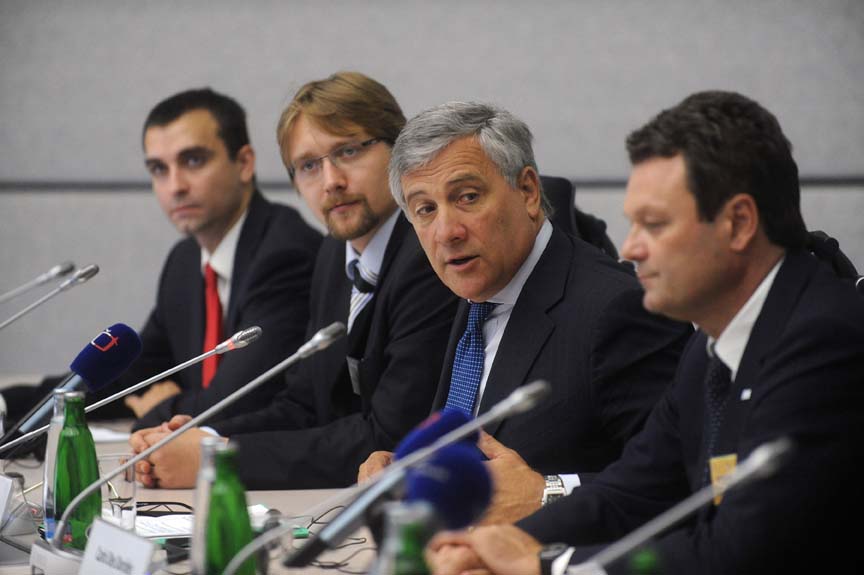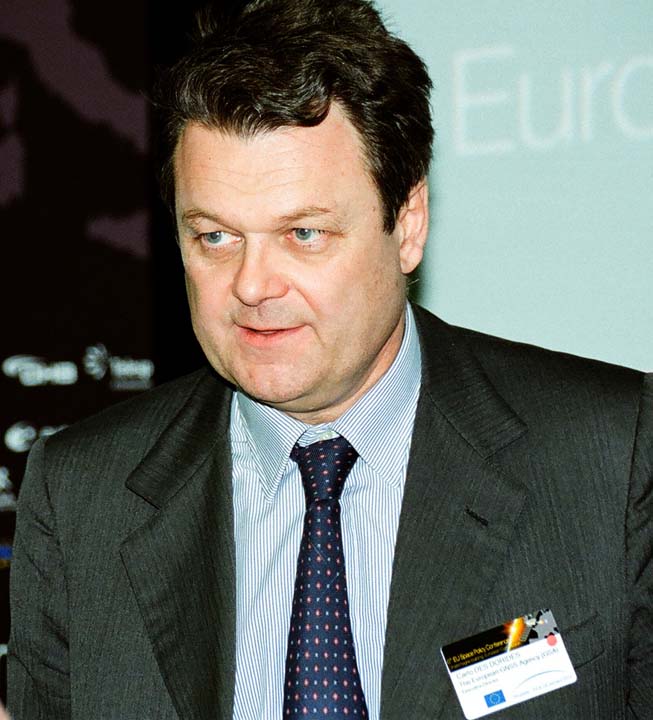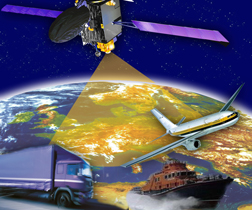
A former officer in the Italian Air Force, Antonio Tajani has been vice-president of the European Commission (EC) since May 2008. Tajani is, however, also the current European Commissioner for Industry and Entrepreneurship, which makes him top man at the European Union (EU) directorate-general that oversees the Europoean GNSS programs, particularly Galileo and the European Geostationary Navigation Overlay Service (EGNOS).
A former officer in the Italian Air Force, Antonio Tajani has been vice-president of the European Commission (EC) since May 2008. Tajani is, however, also the current European Commissioner for Industry and Entrepreneurship, which makes him top man at the European Union (EU) directorate-general that oversees the Europoean GNSS programs, particularly Galileo and the European Geostationary Navigation Overlay Service (EGNOS).
In this exclusive interview with Inside GNSS, he answers questions about where the program’s been, where it is today and where it may be going.
How Do We Measure Success?
In the debate leading up to the original decision to build Galileo, three of the primary benefits advanced for undertaking a European GNSS program were:
• sovereignty/independence/control of a critical infrastructure
• strengthened high-tech expertise among European engineers, scientists, and other professionals
• an expanded share of global GNSS markets for European manufacturers.
So, we began our interview by asking the vice-president how he would assess the importance of each of those projected benefits today. Are there any new arguments for Galileo that have emerged since the program was launched?
Tajani: “These arguments were valid and they remain equally important today. The strategic objective of being technology-independent has not changed. Moreover, it has been a firm conviction of the Commission that developing the use of satellite navigation brings enormous benefits to the economy, society and the environment.
“The most obvious direct benefit of the decision to build Galileo is the growth of the European space market, leading to strengthened high-tech expertise across the EU. Galileo is also bringing about growth of the downstream market for GNSS-based applications and services, leading to the emergence of new applications, new market opportunities, productivity gains across industries and public benefits generated by reduction in pollution or improved levels of safety and security."
No surprise that the man charged with leading Europe out of years of economic “crisis” should stress the power of Galileo to stimulate growth, but on the specific issue of strengthening Europe’s downstream GNSS market, the lack of sufficient European capital investment for start-up companies has been cited as a real obstacle.
We know, for example, that Europe lags far behind the United States when it comes to venture capitalism, including in the GNSS sector. Indeed, there are already specific examples of European GNSS companies relocating to the United States because of the lack of European investors.
So, what is the Commission doing to stimulate venture capitalism in Europe?
Tajani: “One should not disregard the fact that the entrepreneurial culture in the U.S., where both investors and entrepreneurs are quite comfortable with ventures not necessarily turning out as success stories, is different than in Europe. At the same time, the European Commission is doing a lot for the SMEs in the EU. The Competitiveness and Innovation Framework Program (CIP) invested €1 billion to help about 400,000 SMEs. The new Program for the Competitiveness of Enterprises and Small and Medium-sized Enterprises (COSME) will more than double the funding for SMEs. Horizon 2020 will provide the Debt Facility, the Equity Facility and a dedicated SME facility.
“In the area of GNSS, where I believe there is a substantial potential for growth, the Commission, the European GNSS Agency (GSA), the European Investment Fund (EIF) and the European Space Agency (ESA) have joined forces to fill the funding gap for early-stage, high-risk R&D, to stimulate break-through innovations and increase private sector commercialization of research results.”
What is the Commission doing to communicate directly to European private investors about opportunities to make money with European GNSS?
Tajani: “The Commission is being quite active in keeping private investors in GNSS on board. It is co-financing a number of investors’ initiatives in the mobile telecom and mobility world that draw upon GNSS. It supports various matchmaking formats aimed at bringing together investors and start-ups operating in the GNSS sector, such as the European Space Solutions events.
“Representatives of the Commission are taking part in events such as the Mobile World Congress and ESA’s Annual Venture Forum. Apart from that, the GSA, through its yearly Market Report, provides key information in support of entrepreneurship in the satellite navigation sector.”
Coming at the same question from the opposite direction, what are you doing to help GNSS start-ups and young companies find venture capital in Europe?
Tajani: “An important aspect of the synergies established between the Commission and the other institutions involved to help GNSS SMEs across the innovation cycle is the provision by the GSA of GNSS-specific information to the interested companies. The Agency publishes a Funding Guide for SMEs that outlines the best European, national and regional funding opportunities to support investments and projects in the GNSS sector.
“Apart from that, the GSA provides an interface with the key European support services and information points. The help coming from the European institutions is further supplemented by SME support networks, such the Enterprise Europe Network (EEN) with its dedicated Space & Aeronautics group, who offer their own means to facilitate investment in GNSS ventures.”
The European Space Agency has presented data that show the four operational Galileo satellites now in orbit have already had a significant effect on overall GNSS accuracy when their signals are combined with existing GNSS signals (GPS and GLONASS). If this is already the case, with just four working satellites, one can only imagine the level of accuracy that will be available when the full constellation of Galileo satellites is operational.
But will this not then diminish the market share originally envisaged for the Galileo Commercial Service (CS)? After all, one of the key selling points of the CS was to be its high precision. With the Galileo Open Service (OS) already offering a very high level of precision for free, why would potential customers then choose to pay for the CS?
Tajani: “The foreseen level of performance for the OS is in the meter range, whereas for the CS it will be in the centimeter range. We believe they serve different users and market segments and do not cannibalize each other.
“For the time being we are focused on defining what is the best we can do with our present and near-future infrastructure, for the OS, the CS, and the other services. In the next step, we will see what is the best way to exploit the CS, but this will come later.
“The Galileo CS will provide high accuracy as you mention but also may include other services like authentication, which may be attractive for some users and complementary to the OS in a natural way.”
Budget Matters
Keeping Galileo on the right course means ensuring the money is there to complete and then run the system, but the EU Parliament has still not approved the EU’s overall budget, the so-called Multiannual Financial Framework, for 2014–2020. Meanwhile, the European Commission and the European Space agency have become more and more closely linked over the past decade, which also, to some extent, comes down to money.
How confident is the vice-president that the European Parliament will accept the next EU budget, as currently formulated, before the end of 2013?
Tajani: “I am quite optimistic about the acceptance of the next EU budget by the European Parliament. There is a general consensus around this issue because of the very positive impact that the space sector can have on European citizens’ lives.”
With the EC and ESA working ever more closely together, and with the EC essentially delivering and controlling a greater and greater part of the ESA budget, how does Tajani see the relationship between the EC and ESA evolving over the next 10 years?
Tajani: “The Commission attaches great importance to our excellent relations with ESA. They have progressed a lot over the past 10 years, to an extent that today the EU is among the largest contributors to ESA, and ESA has become a de facto implementing agency for many of the EU’s space activities. These relations will become even closer in the coming years. In the next Multiannual Financial Framework, the EU’s space budget will more than double.
“The EU has relied and will to continue to rely on ESA for the implementation of Galileo and Copernicus [the former GMES program — Global Monitoring for Environment and Security]. We are also looking at synergies and complementarities in our space research activities. The EU and ESA have no option but to work closer together, to improve our relations and to make them more efficient and effective. This will guarantee the success of our common space endeavors.
“In November last year, the Commission issued a Communication on this subject, in which we promoted the idea that a ,‘rapprochement’ of ESA towards the EU environment is the only viable option in the long-term. The ESA Member States also adopted a political declaration at the Naples Ministerial Council last November, considering whether an evolution of the agency is necessary so that it best serves Europe. The next couple of years will be crucial in deciding whether there is enough political will in our respective Member States to take this further step. We have a window of opportunity today to improve and rationalize the governance of space activities in Europe. Especially in times of economic austerity, what we need is greater synergies, efficiencies and better governance for better spending.”
The Wider Arena
Some have suggested that China’s decision to claim frequencies for its BeiDou system uncomfortably close to those Europe had already envisaged for its secure Galileo Public Regulated Service (PRS) was almost certainly a pointed reaction to not getting their money back on the aborted China-Galileo deal, when Europe decided to push China out of Galileo’s inner circle.
What is the current status of discussions with China regarding the BeiDou-Galileo PRS frequency overlap?
Tajani: “The EU and China have a long history of cooperation in satellite navigation systems. I met with Minister Wan Gang of the Chinese Ministry of Science & Technology (MOST) in November 2010 and we both agreed that the EU and China needed to work together with the goal being the ‘co-existence under one roof’ of EU and Chinese satellite navigation systems. Thus in 2012 a single forward-looking document called ‘Elements of Consensus’ was signed, which paves the way for a new enhanced cooperation framework between the EU and China.
“The Chinese have agreed that the Galileo/BeiDou overlap issue will be addressed within the International Telecommunication Union (ITU) Framework. Signal interference is bad for everyone, for the EU and for China. Again, common interests demand that we work together to find a solution.”
What about the EC’s relationships with the USA and Russia?
Tajani: “We are working on very good terms with the USA.The USA is very interested in the emerging Galileo satellite navigation system, and we are actively discussing how the two systems can be interoperable. With Russia, we are discussing a possible cooperation agreement.”
Finale
With his considerable experience as a man of power and influence on both Italian and European fronts, Mr. Tajani has seen his share of changes — political, industrial and technological.
What is the most profound change the vice-president sees coming in the space sector in the next 10 years?
Tajani: “Technologies related to space are more and more decisive in achieving growth, innovation, and improving the lives of our citizens. I am sure it’s worth it to invest in this sector.
“We have to be proud of the implementation of the Galileo system, which is the first European infrastructure. It’s a sign of ambition and our willingness to be a global player.”






